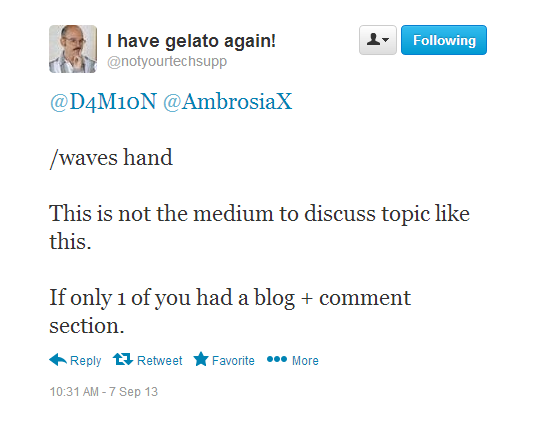I’ve been getting into it once again with my tweeps, so much so that people think I’ve been trolling. At some point, it got so ridiculous that we filled up EllenBeth’s timeline, and I was given some good advice:
Very well then, I’ll take this whole kerfuffle off of Twitter for now. The problem that I was trying to pose was something like this: Under what conditions would it be ethical to publicly name and shame someone? I know this is a loaded topic, so much so that I’d expect one answer from one side of the rift, and a different answer from the other side.
First off, I hope that most of us can agree that an action is ethical when you have good reason to believe that it will most likely cause more good than harm. The relevant goods in play here are warning third parties against bad behavior, which allows them to mitigate their risks, and warning people who engage in bad behavior that they will not be able to continue engaging in such behavior without facing some consequences. The relevant harms are the possibility of overreaction against the shamed behavior, and the possibility of naming the wrong person or mischaracterizing what they did which was supposedly shameful.
The example that I had tweeted about was one in which someone (let’s call him Hans Ziemann) sexually groped a couple of unwilling people of at a conference, in front of witnesses. Now the two people who were groped, along with the eyewitnesses, are faced with an array of possible sanctions, ranging from a criminal trial to nothing at all. Here are a few of them listed out:
- Criminal trial – Pressing charges under the relevant statute for criminal battery.
- Civil trial – Filing a tort suit against Hans for the intentional tort of battery.
- Org policy – Go to the conference organizers and ask for Hans to be warned or sanctioned.
- Publication – Exercising free speech in order to publicly warn everyone in the community.
- Whispernet – Exercising free speech in order to quietly warn those within reach.
- Do nothing – Just let this one go.
No doubt I’ve left something off the list here, but these are indicative of the spectrum of possibilities available to someone who has been groped at a conference. I’m assuming for the sake of argument, of course, that someone really was victimized here, rather than that someone is lying or mistaken or confabulating from rumor. I know that many people are keen on discussing all the ways in which allegations may be false, but that is not what I’m talking about in this post. I am talking from the perspective of someone who knows they have been groped against their will, in a situation where there can be no mistake about it, because it also happened to someone else, and there were witnesses both times.
I would argue that in such a case, there is nothing at all wrong with naming and shaming (option #4 above) if it is done right, and indeed it may well be the best available option, probably in conjunction with #3. But what would it mean to do it right? I’d argue that if the following conditions are met, it is okay to name and shame:
- You are reporting your own experiences rather than passing on someone else’s friend-of-a-friend story.
- You are publishing under your own name, so as to publicly take accountability for the truth of your report.
- You have high confidence in the veracity of your own report, at least high enough that you would be confident of defending against a defamation suit on grounds of truth.
So that’s about it. I know that my friends are going to want to discuss all the ways in which naming-and-shaming can go wrong, but please bear in mind that the point of this post is not to discuss all the ways that people have gotten it wrong, but rather to explore the possibility that it can actually be done right.
Your thoughts?

